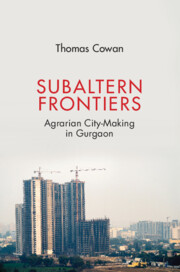Preface
Published online by Cambridge University Press: 12 August 2022
Summary
To get to Gurgaon from the villages that flank the National Highway 48 (NH48) in southeastern Haryana, you have to either take a crowded intercity bus or pile into a shared jeep. As a young researcher, I tended to travel by shared jeep. Accounts of Gurgaon's landscape usually move from New Delhi, southward on the Delhi Metro to HUDA City Centre station at the heart of New Gurgaon, narrating a landscape that transitions from a historic urban centre to its boisterous, nouveau riche neighbour, from urban capital's (post-)colonial being to its unwieldy neoliberal becoming. And yet, I have spent most of the past ten years in Gurgaon moving in a different direction. The jeeps are stacked with twelve other passengers, all of us clutching our small lunchboxes, in Tetris-style formation, silently grimacing as the worn-out suspension ploughs through an assault course of BMWs, SUVs and freight trucks. The NH48 that runs through the centre of Gurgaon forms part of the 1,700 miles of highway that runs from Chennai to New Delhi and is incorporated into the 1 lakh crore rupees Delhi–Mumbai economic corridor. These economic corridors that tear through rural spaces are viewed by politicians as key engines of post-agrarian economic growth vital to the transformation of Delhi's agrarian hinterland into productive, capitalised urban space. They are what Grappi and Dey have termed a ‘neoliberal institution’, one that instructs and joins up the extractive and financialised operations of post-colonial capitalist development.
Riding on the NH48 from Gurgaon's southern periphery, we tear through an expanse of partially irrigated, gridded fields interspersed by clusters of small, whitewashed bungalows and roadside garages. At this point the road becomes increasingly populated by a deluge of billboards hyping the land on our flanks with land brokerage services selling ‘hot land’ and ‘investment opportunities’ in real estate projects yet to materialise. In the winter this part of rural Haryana is masked by a dense, low fog and the warmth of human proximity the jeep affords provides welcome respite from the cold. In 2018 the World Health Organization (WHO) declared Gurgaon the most polluted city in the world and the winter is when the smog is at its worst.
- Type
- Chapter
- Information
- Subaltern FrontiersAgrarian City-Making in Gurgaon, pp. xiii - xviiiPublisher: Cambridge University PressPrint publication year: 2023



